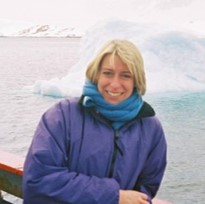Ros Rickaby

Throughout her research career, Ros has aimed to bring life to geochemistry! Ros has pioneered an interdisciplinary blend of biology and chemistry to resolve questions of past climates, evolution, and the future of the phytoplankton. Ros’ distinctive approach is to read geological history from signals of adaptation within genes of modern organisms, which play out in the evolving affinity and kinetics of the expressed enzymes, or isotopic signals of adaptation that leave a footprint in fossils and biomolecules. Ros has authored over 90 papers and co-authored a book “Evolution’s Destiny: Co-evolving chemistry of the environment and life”.
Ros has recently taken up the role of Chair of Geology, Department of Earth Sciences, University of Oxford, having been Professor of Biogeochemistry since 2002, on the dark side (of blue!) as well as mum to two boys. She received her PhD with Harry Elderfield from Cambridge University in 1995 and studied at Harvard for her post-doc with Dan Schrag. In 2008 Ros received the European Geosciences Union’s Outstanding Young Scientist award, in 2010 the American Geophysical Union’s James B. Macelwane Award for significant contributions to the geophysical sciences by an outstanding young scientist and most recently, in 2016, the Lyell Award of the Geological Society of London. She currently holds a Wolfson Research Merit Award from the Royal Society.
Latest News
Royal Society Publishing Photography Competition 2025
Please see a message from the Royal Society below:
We are delighted to announce that the 2025 Competition is now open for entries until 15 August for a chance to win £1000! The competition celebrates the power of photography in conveying the wonder of science happening all around us and photographs can be submitted in the categories of: Astronomy, Behaviour, Earth Science and Climatology, Ecology and Environmental Science, and Microimaging.
The competition is free to enter and open to anyone studying or working in science at graduate level or above. Category winners will receive a one-year membership to the Royal Photographic Society and the overall winner will receive a grand prize of £1,000. Find out more: https://bit.ly/RSPphotocomp
October 2025 MEDIN Workshop: Marine Data Management, Governance and the MEDIN toolset
The Marine Environmental Data and Information Network (MEDIN) are pleased to announce that registration is now open for the next occurrence of our popular free online training workshop: ‘Marine Data Management, Governance and the MEDIN toolset’ on the 13th – 17th October 2025 on OceanTeacher Global Academy.
Marine Data Management, Governance and the MEDIN toolset
The Marine Environmental Data and Information Network (MEDIN) and OceanWise are delighted to invite you to attend our popular free online training workshop: ‘Marine Data Management, Governance and the MEDIN toolset’ on the 19th – 23rd of May 2025.
